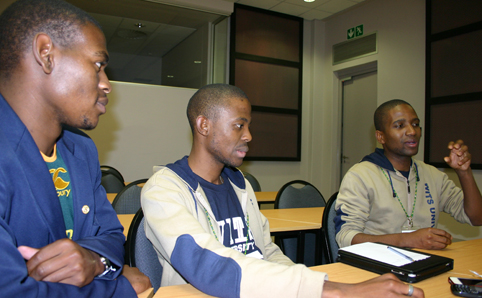|

|
|
This generation has to find a mission, something they can be as passionate about as their predecessors of the 1970s were. A greater nation has just risen. At the 2011 South African Golden Key Summit, were from left: Mr Ruddy Banyini, outgoing President: UFS Chapter; Mr Puso Thahane, President: Wits Chapter, and Mr Katleho Mohono, Vice-President (Internal): Wits Chapter.
Photo: Leonie Bolleurs
|
Our university earned gold status as one of the top chapters in the country. This was one of four awards won by the UFS at the 2011 South African Golden Key Summit held at the Bloemfontein Campus from 6-8 October 2011.
Mr Ruddy Banyini, outgoing Golden Key president (UFS) and the president of the Wits Chapter jointly received the Regional Student Leader of the Year award. The UFS Chapter also took third place for Best Community Service as well as for Best Campus Awareness Initiative. This follows hot on the heels of the chapter winning the Golden Key International Chapter Service Award for the second consecutive year in May 2011.
The summit also yielded some new challenges for all chapters. Mr Banyini and his counterparts from the University of Witwatersrand are on a mission to cultivate a nation of thinkers. This follows the successful hosting of a Thinkers Symposium by the Wits Chapter to determine the contribution thinkers could make towards shaping a better society. “This initiative will see all students on campus mobilised and actively participating,” Mr Banyini said. “Thoughts without action are just thoughts. We are all aware of social ills in our country, yet only a few come forth with a solution,” stated Mr Katleho Mohono (Wits).
The involvement of Golden Key members in helping to create solutions for national problems has triggered a series of think-tank symposiums organised by various chapters. The result has been an exponential growth in the numbers of those collectively involved in the on-line National Planning Commission’s consultative forum. “The impact of mobilising the best current academic achievers in Higher Education opens up exciting new possibilities through constructive student engagement with society’s issues,” Dr Derek Swemmer, Registrar at the UFS,” said.